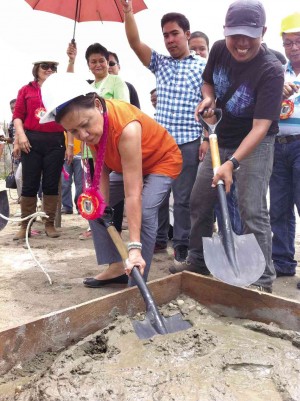Group fears coco levy theft by solons, execs

NEW SEN. Cynthia Villar, who replaced her husband at the Senate, leads groundbreaking rites for a P5-million housing project in Cateel, Davao Oriental, for survivors of Typhoon “Pablo.” The project is funded by the pork barrel of the senator’s husband, former Sen. Manny Villar. NICO ALCONABA/INQUIRER MINDANAO
LUCENA CITY—A militant farmers’ group expressed fears that the estimated P70 billion in coconut levy collected from farmers would end up being stolen by legislators like billions of pesos of so-called pork barrel funds.
Willy Marbella, deputy secretary general of the leftist Kilusang Magbubukid ng Pilipinas (KMP), said the coconut levy funds “are in danger” should these be handled, too, by the agriculture department, which is now embroiled in the pork barrel scandal after several projects that went through it were found to have been nonexistent or did not benefit farmers at all.
Marbella said his group feared that under the Aquino administration, the coco levy funds would end up in the pockets of officials and legislators following President Aquino’s refusal to let go of the pork barrel system.
“His (Aquino) continuing use of the graft-ridden pork barrel system further fuels the culture of impunity in the plunder of public funds,” Marbella said in a statement.
Marbella said Aquino had already included the coco levy funds in the 2014 budget “without the consent and approval of the small coconut farmers.”
Article continues after this advertisementMarbella said that under the proposed P2.3-billion budget of the Philippine Coconut Authority for next year, P305 million would be used to establish “agro-industrial hubs” in five regions—Calabarzon, Bicol, Western Visayas, Eastern Visayas and the Zamboanga Peninsula.
Article continues after this advertisementThe funds for these, he said, are likely to come from the coco levy. Marbella said these hubs were actually the “agri industrial estates” that Agriculture Secretary Proceso Alcala announced in March.
When Alcala announced the estates in March, Marbella said he remembered the agriculture secretary saying, too, that funds for the project were to come from the coco levy.
KMP and the claimants movement, Coco Levy Funds Ibalik sa Amin, have opposed the use of the levy for government projects, saying the money should be returned, instead, to its rightful owners, the thousands of coconut farmers nationwide.